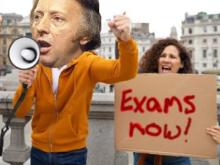Representatives for junior lawyers have slammed the SRA for giving the go-ahead for the Solicitors Qualifying Exam (SQE) to start in September 2021.
The Law Society body which represents junior lawyers, the JLD, said the SRA's proposed exam* will "damage both our reputation internationally and water down the quality of the profession". It criticised the SRA's decision to drop the requirement for a law degree/GDL and to only use multiple-choice questions to assess legal knowledge under the SQE1 exams.
Multiple-choice questions offered no insight into how a candidate analyses information, applies it to a problem and communicates their answer, the JLD told RollOnFriday. It raised similar concerns last year after the SRA revealed results from the SQE pilot.
Julie Brannan, Director of Education and Training at the SRA, defended multiple choice questions as "a tried and tested way of rigorously assessing candidates...used in medicine and accountancy, as well as in legal exams, including the LPC, BPTC and US Multistate Bar Exams.”
“They are not about regurgitating knowledge, but testing the application of fundamental legal principles," Brannan told RollOnFriday, adding that the SQE questions would be "drafted and reviewed by solicitors” and the format had been approved by an independent reviewer following the pilot.

Squeeee?
The traditional approach of sitting separate exams for each subject will also be scrapped, and instead SQE1 will comprise two tests of 180 multiple choice questions each. Critics have argued that such a structure means a candidate will be able to perform badly in one area of law (e.g. contract law), but pass SQE1 overall if their answers in other areas pull up their overall mark.
Brannan dismissed that concern, explaining that analysis from the SRA's pilots involving more than 480 candidates "showed the risks around some candidates passing the SQE, while doing badly in particular areas, was low." She also said SQE1 would avoid the pitfalls of written exams by ensuring that a candidate understood a broad range of fundamental legal principles and would be unable to "question spot" and "get lucky if the right subjects come up".
Written skills will be tested in SQE2, the practical legal skills section, which is set to include 12 written exercises such as drafting, research and case analysis, and can only be undertaken once SQE1 is passed. Critics have asked whether it is right that a candidate with poor writing skills could rack up unnecessary costs by passing SQE1 having answered multiple-choice questions, only to fail SQE2 due to its written element.
“An early skills test could exclude capable candidates, who with more training and professional experience, could develop the right skills to become good solicitors", said Brannan. "We want to make sure everyone has a fair shot at qualifying, but ultimately nobody will qualify if they can’t show they have the right legal skills.”
The JLD told RollOnFriday it will be calling for a delay in the SQE's implementation until changes are made. The super exam is still subject to approval from the Legal Services Board.
* The SQE is set to replace the current training regime, replacing the requirement for a training contract, the GDL and the LPC. Instead aspiring solicitors will need the following: (i) a degree or "equivalent qualification" which can be in a non-law subject (ii) pass legal examinations SQE1 (legal knowledge) and SQE2 (practical legal skills) (iii) two years' work experience, which doesn't have to be in a law firm but could be in a law centre or a law clinic (iv) pass a "character and suitability test" (no record of dishonesty etc).














Comments
38
58
I get a headache reading about the new exams. Anyone else?
47
65
Looks like JLD are right. Multiple choice is the easy option and is hardly "testing the application of fundamental legal principles,"
Why are "the risks around some candidates passing the SQE, while doing badly in particular areas, [being] low" acceptable?
47
57
There is an article on The Lawyer which rinses the exam too:
"One paralegal with no formal legal training got a 43 per cent score on the exam having completed the first 30 questions in just half an hour.
Another paralegal with a law degree but who had not done the Legal Practice Course LPC, completed 30 questions in the same time and got a score of 60 per cent.
Meanwhile, a candidate with a non-legal PhD but no legal training scored 73 per cent after completing the 30 questions in just eight minutes."
The problem is that the current system discriminates against anyone who doesn't have knowledge of the law.
57
68
Personally, I have no issue with the super- exam. However, the requirements do not sit well with me. Why should someone be able to practice law if not having studied it? The current route for people that have not studied law is to do the GDL (which is equivalent to a law degree). How does the SRA justify an individual not having to study law? This is complete nonsense and done nowhere in the world. A doctor goes through law school, an engineer acquires his knowledge by taking the course. But the SRA proposes and is determined to introduce a route that would allow anyone from any country with any degree to come to the UK, simply sit the super-exam and qualify as a lawyer. This approach is just nuts. The route should include having a law degree of some sort - be it an LLB Law degree or GDL.
48
63
My initial reaction to this was negative. Multiple choice? However, on reflection I can see how requiring candidates to distinguish between four plausible but subtly different answers to a complex question while under time pressure could properly test legal aptitude. I guess we will need to see how this is actually implemented.
55
59
I disagree with the above that it could properly assess legal aptitude. This is a fraction of what The Lawyer posted this morning:
“Feedback we received from a candidate who actually participated in the first SQE pilot was that the MCQs did not demonstrate a knowledge of the law, but more a demonstration of common sense.It was noted that a law degree teaches students not only the law, but also a way of thinking within the legal framework, to apply legal knowledge and formulate arguments. This skill is simply not assessed at SQE 1."
Where does it assess legal aptitude if the questions are mainly based on the ability to apply common sense? Basic black letter law - where do these assessments occur because its not tested in SQE2 as far as I am aware.
Will they acquire their basic legal knowledge three weeks prior to working on a project or sitting in at a client meeting?
35
60
Two-tiered profession on the horizon.
Devalues solicitors, note the bar is not taking a similar approach.
48
68
This seems like a storm in a teacup. They seem to essentially be looking to replicate the QLTS which has an initial MCT you need to pass in order to do the practical component. The MCT is much cheaper as it can be computer marked - if you introduce an analytic/essay component at this stage then you introduce the need for marking by hand and moderation, presumably massively increasing the cost. SQE2 can cover off understanding of the law/English ability etc as it currently does for the QLTS.
36
66
LOL @ people that did the PgDL complaining that a method of entry into law is too easy. Hopefully brings in more people capable of doing the work than up themselves snowflakes who can't understand legal basics and think grunt work is beneath them.
51
55
There are already enough half-cocked solicitors under the current system, do we really want to be lowering the quality further?
30
61
SQE 1 MCT is not dissimilar to the California Bar,surely? No LLB or JD required.
c.f. the NY Bar.
38
46
I’ve been doing the same for a month now! I’ve also added QLTS into the picture. I’ve written an article if anyone is interested- https://www.linkedin.com/pulse/qlts-deadline-mct-exempt-apply-admission-last-chance-jarosz